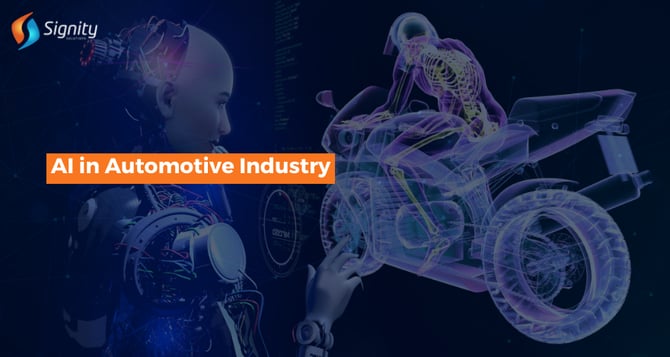Artificial Intelligence in the Automotive Industry: Driving Innovation
Artificial Intelligence (AI) is revolutionizing the automotive industry with innovations like autonomous vehicles, predictive maintenance, and manufacturing optimization. AI improves safety, streamlines production, and enhances user experiences. Partnering with an AI development company can drive innovation and efficiency in this evolving sector.

The automotive industry is undergoing a massive transformation, and artificial intelligence (AI) is at the heart of this revolution. From self-driving cars to predictive maintenance, AI is reshaping how vehicles are manufactured, operated, and maintained. In this blog, we’ll explore the key areas where AI in the automotive industry is making an impact and how it is driving innovation and efficiency.
1. Autonomous Vehicles
One of the most exciting applications of AI in the automotive industry is the development of autonomous or self-driving vehicles. Companies like Tesla, Google’s Waymo, and Uber are pioneering this technology. AI enables these vehicles to process real-time data from sensors, cameras, and GPS to make decisions and navigate roads safely.
- AI-Powered Sensors: These help detect obstacles, pedestrians, and other vehicles to avoid collisions.
- Machine Learning Algorithms: Used to improve the accuracy and decision-making capabilities of autonomous systems over time.
- Benefits: Enhanced road safety, reduced human error, and increased convenience for passengers.
2. Predictive Maintenance
AI plays a critical role in ensuring that vehicles remain in optimal condition. Through AI-driven predictive maintenance, AI can analyze data from vehicle sensors to detect potential issues before they lead to a breakdown.
- AI Algorithms: Analyze engine performance, tire wear, brake conditions, and other parameters.
- Reduced Downtime: Predictive maintenance minimizes unexpected vehicle failures and extends the lifespan of parts.
- Cost Savings: By detecting issues early, AI reduces the overall maintenance costs for vehicle owners.
3. Manufacturing Optimization
AI is streamlining automotive manufacturing processes, from design to assembly. AI development companies are helping automotive manufacturers implement AI-powered robotics and automation tools in factories to improve efficiency, accuracy, and safety.
- AI-Driven Robots: Used in tasks such as welding, painting, and assembling components with precision.
- Supply Chain Optimization: AI helps forecast demand, manage inventory, and improve logistics in manufacturing plants.
- Digital Twins: AI allows the creation of digital replicas of manufacturing systems to simulate and optimize production processes.
4. AI in Infotainment Systems
AI is transforming the in-car experience with smart infotainment systems that improve driver and passenger interaction. Voice assistants like Amazon Alexa and Google Assistant are being integrated into cars to provide hands-free control over various vehicle functions.
- Natural Language Processing (NLP): AI-powered voice recognition systems enable seamless communication between the driver and the car.
- Personalized user Experience: AI analyzes driver preferences and habits to suggest routes, music, and even climate control settings.
5. Enhanced Safety Features
AI is significantly improving vehicle safety through advanced driver assistance systems (ADAS). These systems assist drivers in making better decisions and preventing accidents.
- Lane-keeping Assist: AI helps the vehicle stay in its lane by analyzing road markings and making adjustments when necessary.
- Automatic Emergency Braking (AEB): AI can detect imminent collisions and apply the brakes automatically.
- Adaptive Cruise Control: AI adjusts the speed of the vehicle based on traffic conditions to maintain a safe following distance.
6. Vehicle Design and Prototyping
AI is also being used to enhance the design and development of vehicles. By analyzing consumer preferences, market trends, and historical data, AI can suggest optimal designs for both aesthetics and functionality.
- Generative Design: AI generates design options that meet specific criteria, such as weight reduction, aerodynamics, and material efficiency.
- Virtual Prototyping: AI reduces the need for physical prototypes by creating accurate digital models, saving time and costs in the development process.
7. AI in Electric and Connected Vehicles
As the automotive industry shifts towards electric and connected vehicles, AI plays a pivotal role in ensuring efficient battery management, route optimization, and connectivity features.
- AI for Battery Management: Ensures optimal charging and discharging patterns, extending battery life.
- Connected Vehicles: AI helps vehicles communicate with each other (vehicle-to-vehicle or V2V) and with infrastructure (V2I), enhancing traffic management and reducing accidents.
Conclusion:
AI is set to become even more integral to the automotive industry in the coming years. It will continue to enhance vehicle safety, revolutionize transportation, and optimize manufacturing processes. As automotive companies increasingly adopt AI-driven solutions, the industry will experience greater innovation, efficiency, and sustainability.
Accelerate Innovation in the Automotive Industry with AI
Unlock the potential of AI for smarter vehicles and efficient manufacturing. Let’s revolutionize your automotive processes together!
For businesses seeking to innovate in this space, partnering with an AI development company can accelerate the integration of cutting-edge AI technologies into automotive products and processes.
The future of driving is undeniably connected with AI, and as this technology evolves, the possibilities for AI in the automotive industry will expand further.


%201-1.webp)


.png?width=344&height=101&name=Mask%20group%20(5).png)










.png?width=352&name=Role%20of%20AI%20in%20Software%20Development%20(2).png)







